KELOWNA – A 22.5-acre piece of land in the Lower Mission neighbourhood of Kelowna, one of the city’s best farming areas, is fulfilling the wishes of longtime owners Gordon and Helen Ziegler.
In 2013, Gordon wanted to give the property to a community organization on the condition that it be used to benefit the community for at least 20 years, whether as social housing for seniors or people recovering from addictions, or to enhance food security. A call for proposals attracted 16 submissions. Trinity Baptist Church, a large congregation known for community outreach, was the successful applicant.
While the property sits in the Agricultural Land Reserve, Ziegler also donated three other pieces of land the church could sell to create an endowment fund to help develop and run the farm once the scope of the project was defined. These included two other unproductive ALR parcels totalling 25 acres in the Ellison area as well as a vacant commercial lot in Alberta.
The church received Helen’s Acres in September 2015 and began building fences and installing irrigation with a view to converting it from a vacant field to a vegetable farm. Now, the 20 acres is valued at about $3.5 million. It yielded 60,000 pounds of potatoes and more than 40,000 pounds of other vegetables last year.
Guided by a five-year business plan, Helen’s Acres serves three purposes.
“It’s building community, it’s educating young people on farming techniques and it’s growing nutritious food for people in need,” says Darcy Smith, who formerly taught business courses at Okanagan College and recently retired as Trinity’s executive pastor. He now manages the business side of the farm as well as the endowment fund established with proceeds from the sale of the other three parcels.
He says approximately 90 church volunteers helped operate the farm last year, prepping the soil, planting, watering, weeding, harvesting and cleaning up. Other help came from community groups and businesses looking for ways to give back, including local sports teams, support groups such as Freedom’s Door and Teen Challenge, credit union Valley First and Telus.
About 90% of what they grow goes to the Central Okanagan Community Food Bank. The remaining 10% is sold at the church to raise funds to continue the work at the farm, including funding a full-time seasonal farm manager to help coordinate and take care of the crop and manage who is on the land.
“We give them the first fruits,” says church member Stephen Eng, who oversees the actual production side of the farm. “Usually when you think of food going to the food bank, it’s the seconds. We harvest from the field and ship right to the food bank.”
New experience
Eng first heard about the land at a church meeting after he and his wife moved from Victoria to Kelowna to be closer to their grandchildren. His sales job at Evergro, a division of Nutrien Ag Solutions (Canada) Inc., moved with him. With a UBC plant science degree and agriculture background, he believes he was brought to the region to share his experience and help others learn about farming and growing on the well-drained sandy loam soils at Helen’s.
“It’s not about buying a carrot-planting machine, it’s about traditional planting and harvesting and working in community to do that,” says Eng. “We’ve concentrated on the needs of the food bank. They need potatoes, so we’ll grow more this year. Their ask is 700 pounds a week. We’re also experimenting growing carrots and 5,000 onions.”
This summer, they’ll harvest strawberries, raspberries, rhubarb and asparagus planted last year. The more they get to know the land, the more opportunities they see, including the potential for greenhouses. There are two wells on the property and they have a licence to use water from the nearby irrigation channel, so water isn’t an issue.
“The food bank has asked us to try cauliflower and broccoli and some melons, so we need to figure that out,” adds Eng. “It’s limitless what we can grow, but we need to focus on growing things that are worthwhile for the people who need the food.”
They won’t grow fruit trees because the food bank already receives plenty of fruit.
“Some of this is also figuring out how to best use the volunteer labour force,” says Eng.
“On the community side, we’re partnering with organizations that have like-minded values so we [can] continue to [increase] the amount of planted land and the produce we can grow,” adds Smith.
Partners include groups like Mamas for Mamas, a national non-profit dedicated to helping mothers in crisis and low-income families. Last year, Mamas for Mamas volunteers tended to 50 chickens in the farm’s coop, yielding about 900 eggs a month. Egg production was split 50/50 between the group and the farm foundation. This year, plans call for a new coop to house 100 chickens.
Ozanam, a men’s recovery house, is using the farm to teach skills to its residents. An activity group for men, the Okanagan Men’s Shed, will be using a workshop on the property in 2019.
Both Smith and Eng say the farm is faith in action. Things like irrigation lines, seeds, plants and equipment are donated.
“We’ve also invested over $500,000 in the land, including renovation of the house and shop on the property,” says Smith. “We have tenants in the house, which also helps to fund the costs of the farm.”
Additionally, they’ve leased five acres to a for-profit organic vegetable producer, Unearthed Fine Veggies and Herbs, operated by Jordan Marr. Although the church’s portion of the property isn’t certified organic, Eng says they’re using as many organic practices as they can.
Helen’s Acres also hosted the Central Okanagan Farm Society’s farm incubator program for three years, now on hiatus. The program gave a headstart to Simon Answerth of Kelowna’s Lightfoot Farm, and the church plans to continue offering incubator plots on its own this year. The property could accommodate as many as nine quarter-acre plots in the future if the pilot goes well.
Two people have signed on to date, and the church is hoping for a third. Eng will provide some basic training to help the fledgling farmers take flight.
“I taught a course for six years at the University of Fraser Valley called ‘Sustainable, Holistic Agriculture’ so I’m going to use some of that,” says Eng. “The other thing Darcy and I talked about is trying to be mentors to them in-season as well, not only for this group but for others on the land. There’s a huge difference between looking after the garden in your backyard to expanding to a quarter acre.”
Work will be underway this year to see what grants are available to support the farm’s activities, which have operated at a loss for the past three years. All going well, this year will finally see the farming operation break even.
But even more important, both men see Helen’s Acres as a way to give heart to commercial agriculture.
“There’s a place for commercial agriculture and there’s a place for someone who’s doing a couple acres and there’s a place for community places like ours,” says Eng.
“There’s a connection to the land and to helping people and there’s an educational aspect. Most people don’t know where food comes from. We have tours and bring youth here,” says Smith. “It’s about awareness and heart.”


 Water fees questioned
Water fees questioned